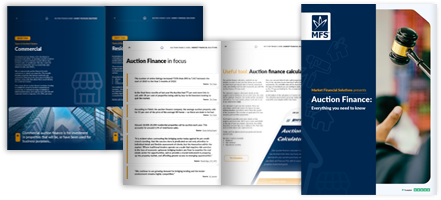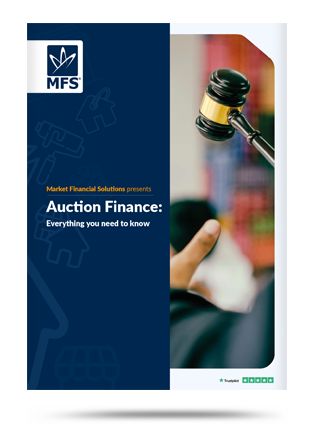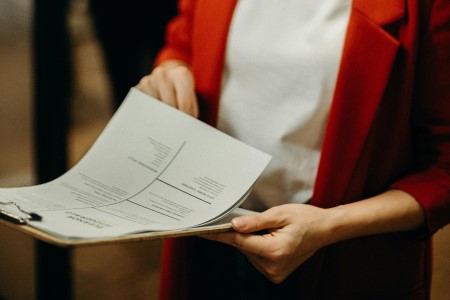
Written by Scott Lord
Deputy Chief Mortgage & Operations Officer – Front End
Market Financial Solutions are a bridging loan and buy-to-let mortgage provider and are not legal, financial, investment or tax advisers. This document is for informational purposes only and does not, and should not be considered, to constitute legal, financial, investment or tax advice or be relied upon by any person to make a legal, financial, investment or tax decision. Therefore, Investors are encouraged to seek appropriate professional advice. The information in this content is correct at time of writing.

The Covid-19 pandemic had a notable impact on the way consumers and businesses purchased goods. It accelerated the shift towards online shopping, a trend that extended into the real estate sector. Specifically, the pandemic meant that buying a property at auction became a more popular way of adding to one’s buy to let portfolio.
The trend continued long after social distancing and lockdowns ended. In fact, according to Moverly, the number of homes coming to auction in the UK grew by 11.3% in the year to June 2023. Auction sales rose from 13,854 in 2021/22, to 15,424 in 2022/23.
Consequently, more than £2.9 billion worth of investment was pumped into residential auctions in 2022/23. Evidently, modern auctions have come to the forefront of how people buy and sell their homes.
However, for those investors, landlords or brokers who have not yet made a foray into the property auction space, the ‘modern auction’ may look different to the traditional auctions of the past.
Indeed, we are often asked ‘what is a modern auction?’ by many of our clients. Many of whom are unaware that there’s more than one type of auction at all. Which is why we have created this blog to provide some clarity.
Source: Estate Agent Today
Answering – What is a modern auction?
Many auction houses and estate agents now put properties for sale under what they refer to as the ‘modern method of auction’. But what is a modern auction?
Otherwise known as a conditional auction, the modern auction differs to the traditional method of selling or buying a property at auction in several ways.
The modern method of auction means that when an offer is accepted, or the auction closes, the successful buyer is required to put down a non-refundable deposit – or reservation fee – to reserve the property.
This means that agents receive a higher fee for an auction property than they might have done in the past from the buyer, not the seller (who would historically have to cover the agent fees in the traditional method).
If the property sale falls through because of the seller, however, the reservation gets refunded to the purchaser entirely. Therefore, a seller can pull out of a sale, but they could quickly rack up considerable costs by doing so.
Under this modern method of auction, any property of any type or condition can be sold. This means potentially more complex property sales – such as the sale of a short-lease flat – can still be made.

What is a modern auction and are they different from a traditional auction?
One of the major ways in which modern auctions differ to traditional auctions is the types of property that are sold. Whereas a traditional auction usually carries the stigma that the only homes for sale are undesirable or un-mortgageable, modern auctions have a lot more breadth when it comes to the types of property available.
Furthermore, auction sales can start as soon as a property goes to market, rather than having to wait for a set auction date under a traditional arrangement.
Traditional auctions can also be difficult for average buyers. They can often be more intimidating. On the other hand, modern auctions – due to their online nature – can be a lot more familiar and less intimidating. Buyers can also be supported by estate agents or auctioneers who are able to help them with the process.
For sellers, traditional auctions usually mean there are fewer buyers who could purchase their property, with less time for a sale to be made (they usually only last a few minutes), which means that reserve prices tend to be lower. Conversely, modern auctions have a wider breadth of buyers, pushing up competition and reserve prices as a result.
Finally, one of the main differences between modern and traditional auctions is that mortgage contracts do not have to be exchanged on the same day for modern auctions. This allows for buyers to organise finance within the deadlines involved.
How does a modern auction work?
For sellers
When selling a property at a modern auction, vendors must first allow their chosen auctioneer to carry out an auction appraisal. Normally, this involves the auctioneer themselves, or someone from the auction house carrying out a valuation of a property before it is made available to buyers.
The auctioneer will then share the valuation with the seller, and recommend a reserve price for their property. The sale then moves onto the on-boarding process, which involves the following three stages:
- Sign up – In a similar way to estate agents creating a contract with a seller, the auction house will send the seller an agreement to get the process started – usually, this will include details about how the auction actually works.
- Legal Pack – The vendor will then be referred to a solicitor, who will put together a legal pack for the sale. Buyers can access this legal pack later in the process.
- Property listing – Finally, the property listing will be prepared, which typically involves professional photographs, creating a floor plan and writing a description of the home (normally paid for by the auctioneer).
Once these processes have been completed, the property will be made available for viewings and bids. If buyers like what they see, and are happy with the property’s legal pack, they are free to make a bid on the property. The auctioneer will then keep the seller in the loop on how the bidding progresses.
Generally, the closer the bidding deadline for the auction gets, the more viewings’ sellers will see, and bids will tick up. Once the deadline has passed, the winning buyer then has to pay a non-refundable deposit and, depending on whether the buyer is a cash or mortgage buyer, the sale is normally completed either in four or eight weeks.
It is extremely rare for an agreed auction purchase to fall through. Just 1% are not finalised when a sale has been agreed, according to Home Selling Expert (for regular property sales, between 30-40% fall through).
In terms of fees, it tends to depend on the auction house. The majority will charge the buyer with any fees that the auction house incurs. But some will charge the seller, and some even charge hybrid-fees.
Under a hybrid-fee arrangement, buyers and sellers share the cost between them, but the seller tends to pay more in auction entry fees.
Source: Home Selling Expert, Home Selling Expert
For buyers
When buying a property at auction, it is important to prepare properly and carry out all due diligence before making a bid on a property. Many buyers will typically visit the property to take a look, and sometimes carry out surveys. They also review the legal pack in full – or at least should.
Once an auction has been won, the buyer is committed to the purchase. This is why it is so important for buyers to do their homework ahead of time. This includes having the necessary finances arranged to complete the acquisition.
Pros and cons of a modern auction
Pros
One of the main advantages of buying a property at auction is that they can often be bought at a lower price than through an estate agency. Some estimates suggest that properties sell for around 10-15% less than their full value.
Another pro of the modern method of auction is that it encourages faster sales. Due to the hard deadline of the completion date, contracts are exchanged in 28 days, and the deal is completed in 56 days.
Adding to the popularity of auctions, modern bids are largely carried out online, making it a much more convenient process. With a deadline in place that allows for viewings of a property before the auction deadline, buyers also have the advantage of having more time to consider, while they also remove the risk of being gazumped at the last minute.
Source: Home Selling Expert, Rightmove
Cons
However, with the non-refundable reservation fee usually costing around 5% of the property purchase, auction fees mean that buyers might encounter more costs at a modern auction.
Similarly, stamp duty still applies for auction properties, and buyers do not know what the final purchase price is until the auction closes. Another potential disadvantage is that once an auction has been won, the buyer is committed to buying the property, which could be detrimental to buyers who are stuck in a property chain or face an unexpected complication.
Similarly, the inflexible nature of the auction deadlines means that people may be left in the lurch and have to lose their fees.
For sellers, one of the key concerns of a modern auction is that there is not the same legally binding commitment to a purchase that a traditional auction entails – despite the significant financial fees that buyers must pay if they pull out of a deal.
Source: Home Selling Expert
Can I get a mortgage for a modern auction?
In short, yes; buyers can get a mortgage for a modern auction. However, many lenders’ application processes take a long time, particularly on the high street. So, buyers may benefit from taking out a bridging loan to give them the finance needed to buy the property, and the breathing space to organise a longer-term financial option.
At Market Financial Solutions, our short-term bridging loan for auction property is a specialised finance product which allows bidders to meet tight deadlines. From the moment a winning bid is locked-in, buyers usually have mere weeks to organise finance and complete the purchase.
Our auction bridging loan provides borrowers with time to cover the initial investment, organise long-term plans, or get renovation works underway so the property may be sold on.
To find out more about our loans, head to our website.
The Complete Guide to
Auction Finance
A simple guide to advance your portfolio
- Comprehensive overview
- Auction finance types
- Useful tools
- Industry stats & more





